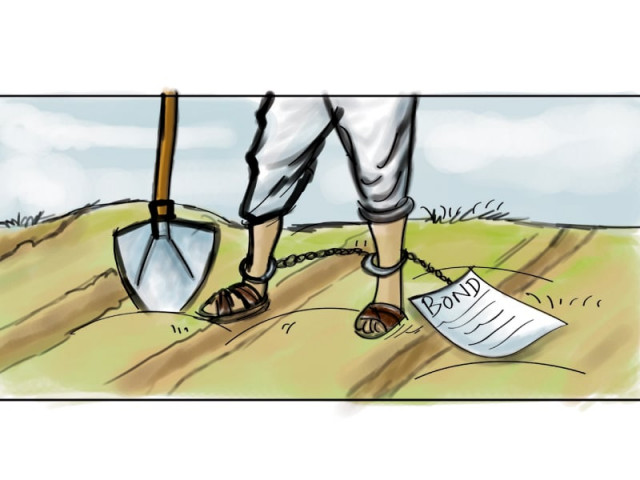SC seeks report on the status of ‘Haris’ in Sindh
Court also asked federal and Sindh governments to explain whether ‘haris’ are still being detained in private jails

Attorney General for Pakistan and Advocate General Sindh were also ordered to personally appear on the next date of hearing and assist the court in this matter. ILLUSTRATION: MUNIRA ABBAS
The apex court has also asked the federal as well as the Sindh governments to explain whether ‘haris’ including women and children are still being detained as bonded agriculture labourers in private jails maintained by wealthy landlords in the province.
Attorney General for Pakistan and Advocate General Sindh were also directed to personally appear on the next date of hearing and assist the court in this matter.
While hearing the petition of Sindh Qaumi Saath (SQS) president Abdul Hafeez Qureshi and others, the two-member bench comprising of Justice Anwar Zaheer Jamali and Justice Azmat Saeed Sheikh made Federal Secretary Interior, Home Secretary Sindh and 14 others as respondents.
The petition was filed in 1996 under Article 184(3) read with Articles 199, 187(1), 189 and 190 of Constitution, raising several questions of public importance not only with reference to enforcement of fundamental rights.
According to petition ex-MPA Mir Hayat Khan Talpur and Mureed Khan Maree of district Sanghar Sindh were using thousands of forced agricultural labourers, including women and children, on their land in Digri and Sanghar. The petitioners alleged that the feudal lords harassed them and violated their fundamental rights guaranteed under Article 2-A, 9, 11, 14, 15, 17 and 25 of Constitution.
“The constitution is a living document, which reflects the aims and aspiration, gerus, gnesis, temper and thinking of people. It is not merely imprisonment of the past which but it is also alive to the unfolding of the future. Therefore, a flexible and progressive approach which may extern benefit to the constitution to the people at large has to be preferred. The constitution should be given liberal and broad interpretation which promotes harmony, consistency and keep the constitution alive and progressive”, says the petition.
Earlier the case was taken up by a Supreme Court bench in 2000 headed by then Chief Justice Irshad Hasan Khan in which the court had also inquired about the allegations levelled in the petition particularly about presence of private jails and bonded labour in the agriculture sector.
Upon the request of the petitioners, the bench had directed ex-MPA Mir Hayat Khan Talpur and Mureed Khan Maree of district Sanghar Sindh to release forced agricultural labourers including women and children detained by them.
The petitioners had alleged that the influential politicians were using thousands of forced agriculture labourers including women and children on their lands in Digri (Mirpur Khas) and Sanghar adding that when SQS launched a movement for the liberation of forced labour from May 1996 onwards, these landlords took counter measures against the petitioners by inciting members of the then provincial assembly against them. The landlords also defamed and discredit SQS through registration of false cases on cooked up charges, the petition contended.
In July 213, the then Chief Justice Iftikhar Muhammad Chaudhry had also cautioned the Inspector General Punjab that the concerned District Police Officer (DPO) will be held responsible if the court in future receive complaints of bonded labour or habeas corpus application for detaining such labourers.



















COMMENTS
Comments are moderated and generally will be posted if they are on-topic and not abusive.
For more information, please see our Comments FAQ